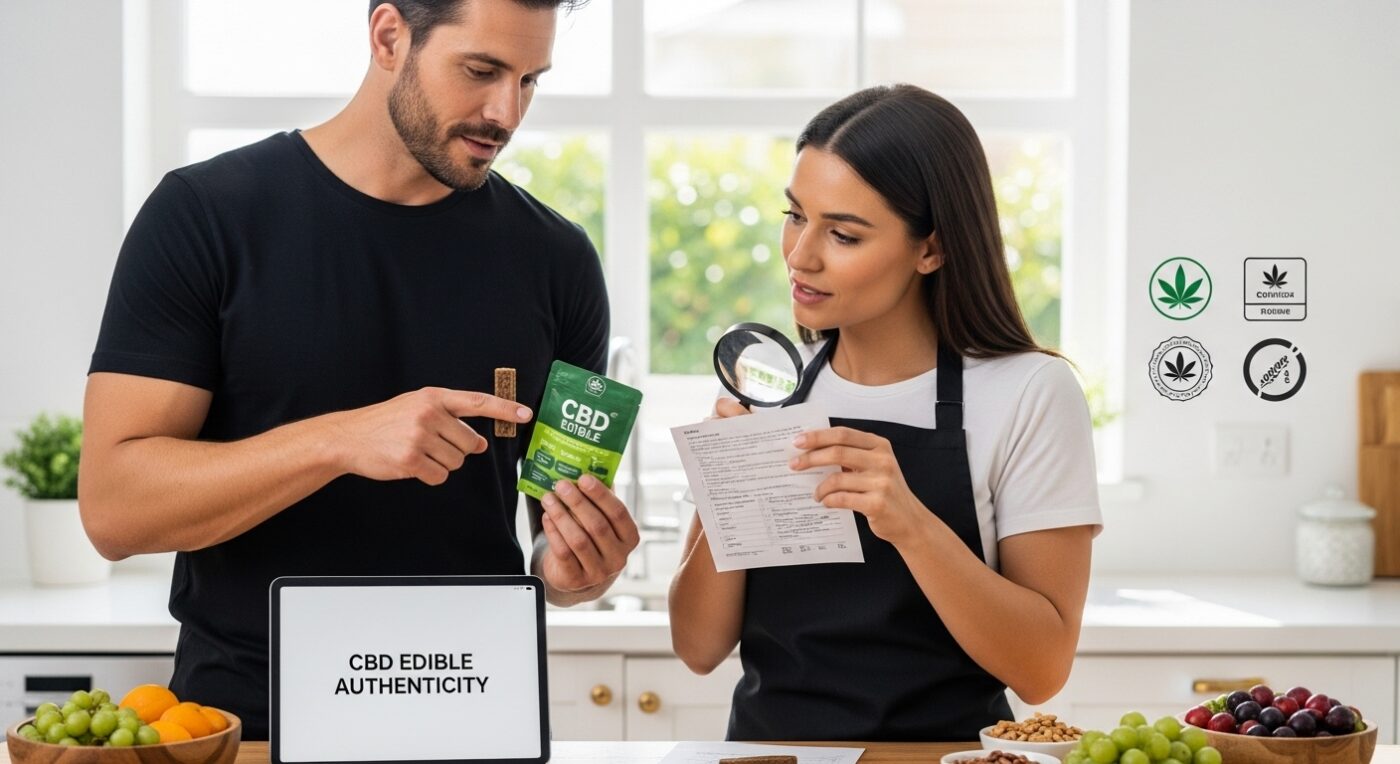Blog
Understanding CBD Edible Authenticity: What You Need to Know
CBD edibles are everywhere and shoppers expect to get exactly what the label claims. Shocking as it sounds, almost half of CBD products on the market fail basic accuracy tests according to multiple consumer studies. Authenticity in CBD edibles is not just about avoiding fakes or knockoffs, since getting it wrong can mean real health risks and legal headaches. What most people overlook is that true authenticity is your shield—it is the only sure way to know what you are putting in your body is both safe and exactly as promised.
Table of Contents
- What Is Cbd Edible Authenticity?
- Why Does Cbd Edible Authenticity Matter?
- How Cbd Edible Authenticity Works
- Key Concepts Surrounding Cbd Edible Authenticity
Quick Summary
| Takeaway | Explanation |
|---|---|
| Verify the cannabinoid concentration | Check for precise measurements to ensure product accuracy and quality. |
| Seek third-party lab reports | Authentic products provide lab testing documentation confirming ingredient purity and safety. |
| Look for transparency in sourcing | Ensure the product details its cultivation and extraction methods to guarantee authenticity. |
| Regulatory compliance is crucial | Manufacturers must follow strict guidelines for labeling, safety, and product consistency to protect consumers. |
| Educate yourself on cannabinoids | Understanding cannabinoid interactions helps consumers make informed choices about product efficacy and safety. |
What is CBD Edible Authenticity?
CBD edible authenticity represents the verification and confirmation of a cannabis-infused product’s genuine quality, composition, and safety standards. At its core, authenticity ensures that consumers receive exactly what manufacturers claim regarding cannabinoid content, ingredient purity, and manufacturing processes.
Understanding Product Verification
Authenticity in CBD edibles involves multiple critical verification aspects that protect consumer interests. Research from the Food Safety Authority highlights the importance of rigorous product assessment. Key verification components include:
- Precise cannabinoid concentration measurements
- Comprehensive ingredient analysis
- Verification of extraction methodologies
- Confirmation of legal compliance standards
- Third-party laboratory testing documentation
These verification processes help consumers distinguish between legitimate, high-quality CBD products and potentially substandard or fraudulent offerings in an increasingly complex market.
Regulatory Compliance and Consumer Protection
Regulatory frameworks play a fundamental role in establishing CBD edible authenticity. Manufacturers must adhere to strict guidelines that mandate transparent labeling, accurate potency reporting, and consistent product quality. Legal compliance serves as the foundation for building consumer trust and ensuring that CBD edibles meet established safety standards.
Consumers should look for clear indicators of authenticity such as detailed lab reports, comprehensive ingredient lists, and certifications from recognized testing institutions.
The following table summarizes the main features used to verify the authenticity of CBD edibles, providing a quick reference for what consumers should look for in legitimate products.
| Feature | Description |
|---|---|
| Cannabinoid Concentration | Accurate measurement of CBD and other cannabinoids in each product. |
| Third-Party Lab Testing | Independent testing to confirm ingredient purity and safety. |
| Transparency in Sourcing | Clear information about cultivation and extraction methods. |
| Regulatory Compliance | Adherence to legal requirements for labeling and safety. |
| Ingredient List Transparency | Full disclosure of all ingredients in the edible. |
| Certifications | Proof from recognized institutions confirming product legitimacy. |
| These elements provide tangible evidence of a product’s legitimacy and commitment to quality standards. |
Why Does CBD Edible Authenticity Matter?
CBD edible authenticity is critical because it directly impacts consumer safety, legal compliance, and overall product reliability. In an unregulated market, the potential risks associated with inauthentic products can range from mild inconveniences to serious health complications.
Health and Safety Implications
Research published in PubMed reveals profound implications of product inauthenticity. Mislabeled or counterfeit CBD edibles can expose consumers to significant health risks, including:
- Unexpected psychoactive compound exposure
- Potential contamination with harmful substances
- Inaccurate cannabinoid concentration levels
- Unknown interactions with existing medications
- Risk of consuming unlisted allergens
These potential hazards underscore why rigorous authenticity verification is not just a preference but a critical consumer protection mechanism.
Legal and Financial Consequences
Product authenticity extends beyond health concerns into legal and financial domains. Consumers purchasing inauthentic CBD edibles risk encountering products that violate regulatory standards, potentially leading to legal complications. Manufacturers producing mislabeled products may face substantial penalties, including product recalls, significant fines, and potential legal action.
Moreover, financial investments in unverified products represent direct economic risks for consumers. Authentic CBD edibles guarantee that customers receive the precise product they expect, with guaranteed potency, quality, and safety standards. This transparency protects consumer interests and maintains market integrity.
Consumer Trust and Market Reputation
Authenticity serves as the foundational element of consumer trust in the CBD market. When companies consistently demonstrate commitment to transparent, verifiable product standards, they build long-term credibility. Consumers who can confidently verify product claims are more likely to develop brand loyalty and recommend products within their networks.
Ultimately, CBD edible authenticity matters because it represents a commitment to consumer well-being, legal compliance, and responsible market practices.
This table outlines key areas of risk and consequence when CBD edible authenticity is not ensured, helping readers understand the impact of inauthentic products on health, legal standing, and consumer trust.
| Area | Potential Consequences |
|---|---|
| Health & Safety | Exposure to psychoactive compounds, contamination, inaccurate dosage, allergen risks |
| Legal | Violations of regulations, risk of fines, recalls, and legal action |
| Financial | Loss of money on ineffective or unsafe products, costs from non-compliance |
| Consumer Trust | Erosion of confidence in brands, diminished brand reputation |
| Market Integrity | Increase in low-quality products, overall market instability |

How CBD Edible Authenticity Works
CBD edible authenticity operates through a comprehensive system of verification, testing, and regulatory compliance designed to ensure product integrity from manufacturing to consumer consumption. This multifaceted approach involves several sophisticated mechanisms that work together to validate product quality and safety.
Laboratory Testing Protocols
According to the FDA, authenticity begins with rigorous laboratory testing. Comprehensive analysis involves multiple critical examination stages:
- Cannabinoid profile quantification
- Contaminant screening
- Pesticide residue detection
- Heavy metal concentration assessment
- Microbiological contamination testing
These detailed scientific evaluations provide precise measurements of CBD concentration, ensuring that product labels accurately reflect the actual cannabinoid content and purity.
Traceability and Supply Chain Verification
Authenticity extends beyond laboratory testing into comprehensive supply chain tracking. Manufacturers must maintain detailed documentation that traces each product’s journey from hemp cultivation through extraction, manufacturing, and packaging. This documentation includes:
- Precise cultivation location records
- Extraction method documentation
- Batch-specific production logs
- Chain of custody documentation
- Ingredient sourcing transparency
Traceability allows consumers and regulators to confirm the legitimate origin and processing of CBD edibles, creating an accountability framework that minimizes potential fraudulent activities.
Regulatory Compliance Mechanisms
Regulatory frameworks serve as the final authentication layer. Manufacturers must adhere to strict guidelines that mandate transparent reporting, consistent quality control, and compliance with local and national standards. These regulations require companies to implement robust internal verification processes, conduct regular third-party audits, and maintain comprehensive quality management systems.
By integrating scientific testing, supply chain transparency, and strict regulatory oversight, CBD edible authenticity works as a comprehensive protection mechanism that safeguards consumer interests and maintains industry integrity.

Key Concepts Surrounding CBD Edible Authenticity
CBD edible authenticity encompasses a complex network of scientific, regulatory, and consumer protection principles that extend far beyond simple product verification. Understanding these key concepts helps consumers and manufacturers navigate the intricate landscape of cannabinoid product regulation and quality assurance.
Cannabinoid Interaction Dynamics
Research from Johns Hopkins Medicine highlights the sophisticated interactions between different cannabinoids that significantly impact product authenticity. Key cannabinoid interaction principles include:
- Complex metabolic pathways between CBD and THC
- Potential synergistic or inhibitory effects
- Individual biochemical variations in cannabinoid processing
- Impact of extraction and formulation methods
- Variability in cannabinoid absorption rates
These intricate dynamics underscore the importance of precise product formulation and comprehensive chemical profiling in establishing authentic CBD edible products.
Regulatory and Compliance Frameworks
Authenticity in CBD edibles is fundamentally rooted in robust regulatory frameworks that establish standardized guidelines for product development, testing, and marketing. Critical compliance elements involve:
- Mandatory third-party laboratory testing
- Transparent ingredient disclosure
- Consistent potency reporting
- Comprehensive safety protocols
- Rigorous quality control mechanisms
These frameworks create a structured approach to ensuring product reliability, protecting consumer interests, and maintaining industry standards.
Consumer Education and Transparency
Ultimately, CBD edible authenticity relies on a symbiotic relationship between manufacturers and consumers. Transparent communication about product composition, potential effects, and scientific validation empowers consumers to make informed choices. Manufacturers must provide clear, accessible information about extraction methods, cannabinoid profiles, and potential interactions, transforming authenticity from a technical requirement into a trust-building mechanism that promotes responsible consumption and industry credibility.
Experience True CBD Edible Authenticity With Good Tide
Are you frustrated by CBD edibles that do not live up to their labels or worried about hidden ingredients and unclear lab results? You learned in “Understanding CBD Edible Authenticity: What You Need to Know” that safety, transparency, and genuine cannabinoid composition are not luxuries—they are essential. Too many brands cut corners, but your well-being and confidence should never be compromised.

Good Tide CBD Gummies was built for people who value real transparency and insist on proof. Every batch of our solventless hash rosin gummies comes with third-party lab reports you can verify for yourself. We take pride in precise cannabinoid information, fully listed ingredients, and honest product descriptions so you always know what you are getting. Visit Good Tide CBD Gummies now to browse our collection, explore each flavor and effect, and review complete lab results before you buy. See what authentic CBD quality truly tastes like and make your next purchase with complete confidence.
Frequently Asked Questions
What does CBD edible authenticity mean?
CBD edible authenticity ensures that cannabis-infused products meet claims about quality, composition, and safety. It involves verification of cannabinoid content, ingredient purity, and manufacturing processes.
How can I verify the authenticity of a CBD edible?
To verify authenticity, look for detailed lab reports, clear ingredient lists, and certifications from recognized testing institutions. These indicators provide evidence of a product’s legitimacy and quality standards.
Why is verification important for CBD edibles?
Verification is crucial as it safeguards consumer health by ensuring accurate labeling, preventing exposure to harmful substances, and compliance with legal standards, thereby protecting overall consumer interests.
What testing protocols are involved in ensuring CBD edible authenticity?
Authenticity is ensured through laboratory testing protocols that measure cannabinoid profiles, screen for contaminants, and assess heavy metals and microbiological safety, ensuring product labels reflect actual content and purity.

